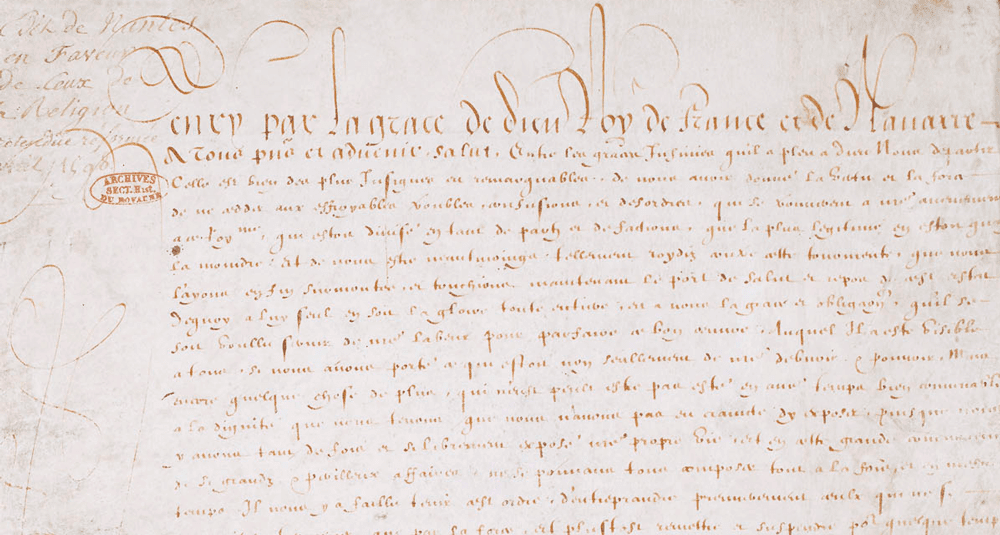Which King of France promulgated the Edict of Nantes on April 30, 1598?
Last Updated:
On April 30, 1598, French King Henri IV promulgated the Edict of Nantes, a fundamental text that marked the end of the Wars of Religion that had bloodied the kingdom for over three decades. This historic edict granted Protestants, also known as Huguenots, limited freedom of worship, while reaffirming the primacy of Catholicism. It was one of the first European texts to attempt legal cohabitation between two religious denominations in the same state.
Henri IV, born Henri de Navarre, was of Protestant origin. He became King of France in 1589, after a long period of religious and political turmoil. To ease tensions and establish his power over a predominantly Catholic kingdom, he abjured Protestantism in 1593, uttering the famous (attributed or apocryphal) phrase Paris vaut bien une messe (Paris is worth a mass).
But even as he embraced Catholicism, Henri IV never forgot his roots or the suffering of French Protestants. His aim was clear: to put an end to the civil wars and bring peace to a kingdom ravaged by conflict.
The Edict of Nantes was signed in Nantes on April 30, 1598. It comprised four main texts, including a preamble, secret articles and special articles granting certain local rights. The Edict had legal, not constitutional, value, meaning that it could be revoked, as would later be the case.
The main provisions of the edict:
- Freedom of conscience: everyone is free to hold their own beliefs, without interference;
- Freedom for Protestants to worship in designated places (outside Paris and Episcopal cities);
- Recognized civil rights for Protestants: access to public office, the judiciary, schools and hospitals;
- Places of safety: certain towns, such as La Rochelle and Montauban, are granted to Protestants for their protection.
The Edict of Nantes did not put all religions on an equal footing, Catholicism remained the state religion, but it did represent a compromise unprecedented in Europe at the time.
Thanks to the Edict, France entered a period of relative religious serenity, even if tensions did not totally disappear. The most intransigent Catholics criticized the concessions made to heretics, while some Protestants considered the rights granted insufficient.
Henri IV, with his pragmatism and concern for unity, managed to maintain the balance until his assassination in 1610. His successor, Louis XIII, and above all Louis XIV, adopted an increasingly repressive policy towards Protestants.
Finally, in 1685, Louis XIV revoked the Edict of Nantes with the Edict of Fontainebleau, banning Protestant worship and triggering a wave of mass exile of Huguenots to Protestant countries such as Switzerland, the Netherlands, England and the German states.
The Edict of Nantes represents a key moment in the history of France and Europe. It embodies an attempt at institutional religious tolerance, well before the Enlightenment. Although it did not fully recognize the equality of all religions, it represented a major legal advance for its time.
It inspired other countries and served as a benchmark for 18th-century thinkers on freedom of conscience. Its repeal, a century later, was seen as a regression in fundamental rights, and caused considerable human, economic and cultural losses for France.
King Henri IV promulgated the Edict of Nantes on April 30, 1598 to reconcile Catholics and Protestants and put an end to the Wars of Religion. This founding edict established relative religious peace, while laying the foundations for modern thinking on tolerance and freedom of conscience.
history

Which King of France promulgated the Edict of Nantes on April 30, 1598?
Answer
The Edict of Nantes, promulgated on April 30, 1598, was signed by King Henri IV of France to guarantee religious peace between Catholics and Protestants.